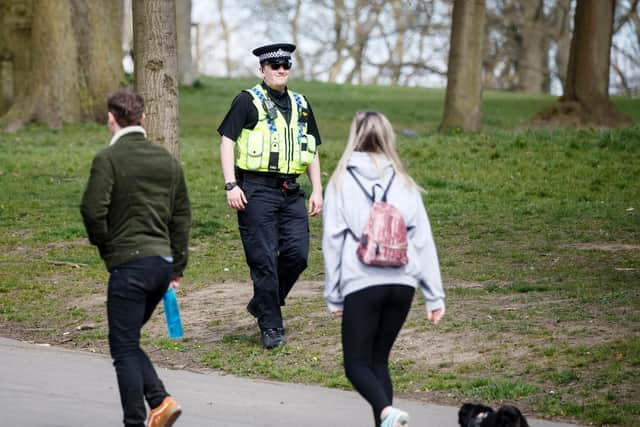Majority of coronavirus fines went "unpaid" in three out of Yorkshire's four police forces
Freedom of Information data gathered by the PA news agency shows that in West Yorkshire, where police issued some of the highest numbers of fixed penalty notices to people caught breaching lockdown restrictions, 497 out of 756 fines issued between March 27 and September 21 (66 per cent) had not been paid within 28 days.
In Humberside, the proportion of the 140 fines issued in the same period which went unpaid was 63 per cent, while in South Yorkshire it was 60 percent of the 375 fines issued.
Advertisement
Hide AdAdvertisement
Hide AdNorth Yorkshire, which issued the highest number of fines in England with an astonishing 1,151 fixed penalty notices (FPNs) issued between the end of March and September, saw 41 per cent of these go unpaid.


Cleveland Police saw the highest proportion of unpaid fines, with 215 out of 298 (72 per cent) penalty notices not settled.
Between one and 29 per cent of fines issued across Yorkshire were rescinded, the data also shows.
West Yorkshire Police annulled 29 per cent following legal challenges, while South Yorkshire Police rescinded 19 per cent and North Yorkshire Police 14 per cent.
Advertisement
Hide AdAdvertisement
Hide AdJust two out of 143 (1.43 per cent) fines issued by Humberside were cancelled.


Kirsty Brimelow QC, a human rights barrister at Doughty Street Chambers, said it was “predictable” people would stop paying fines, and questioned their effectiveness in preventing the spread of Covid-19.
With some not being able to afford to pay them or not feeling they did break any laws, Ms Brimelow added others “may just be resentful that those in power acted as if the laws did not apply to them”.
Calling for panels to be set up to review fines, she said: “Currently, it is a lottery whether you are fined and whether it will be rescinded.
Advertisement
Hide AdAdvertisement
Hide Ad“And it is questionable as to how effective issuing fines is to preventing the spread of the virus.


“Rather they are adding stress and hardship to people who already are suffering.”
Madeleine Stone, legal and policy officer at campaign group Big Brother Watch, said the figures “make it plain that there are serious failings in the way police have issued fines during the pandemic” and described unpaid lockdown fines as a “prosecution crisis waiting to happen”, adding: “The laws governing lockdowns are constantly changing, complex and poorly drafted.”
Owen Weatherill, the officer leading the policing response to the pandemic, told MPs last month that it had taken forces time to understand the changing lockdown rules, and said that he had pushed the Government to keep messaging for the public simple.
Advertisement
Hide AdAdvertisement
Hide AdA spokesman for the National Police Chief's Council (NPCC) said: “We have enforced the law as set by the Government and Parliament. It is only right that fines are then processed in accordance with the law and we therefore encourage people not intending to contest a fine to pay it.
“If any individuals are concerned about why they have received a fine, they can raise it with the force which issued the FPN within the 28-day payment period.
“Officers will have recorded their justifications for issuing an FPN, along with providing evidence to support any breaches of the regulations.
“Once a fine is contested or unpaid the case will proceed to court. Police forces review all of these cases to further ensure only those cases that meet the evidential and public interest test are heard in court.”
Advertisement
Hide AdAdvertisement
Hide AdSupport The Yorkshire Post and become a subscriber today. Your subscription will help us to continue to bring quality news to the people of Yorkshire. In return, you'll see fewer ads on site, get free access to our app and receive exclusive members-only offers. Click here to subscribe.